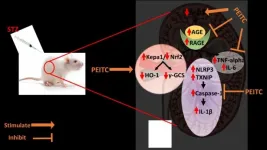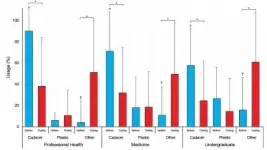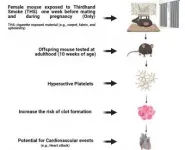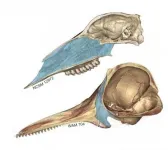(Press-News.org) What makes the human brain special? It's not the time it takes to mature, according to new research. Scientists report the human frontal cortex, the part of the brain involved in higher-level thinking and reasoning, follows a developmental trajectory similar to that of other primates including chimpanzees and macaques.
"We find no evidence that frontal cortex maturation is unusually extended in humans," said Christine Charvet, PhD, assistant professor at Delaware State University and the study's lead author. "Overall, our studies converge to demonstrate a surprising level of similarity in brain structure and development between humans and other studied primates."
Charvet will present the research at the END
Brain development is surprisingly similar between humans and other primates
Study offers first comprehensive view of brain maturation across species
2021-04-27
ELSE PRESS RELEASES FROM THIS DATE:
Using big data to save babies
2021-04-27
Rockville, Md. (April 27, 2021)--Although bronchopulmonary dysplasia (BPD)--a chronic lung disease affecting newborns--is the most common complication of preterm birth, it remains difficult to diagnose and treat. Researchers from Fundación INFANT in Buenos Aires, Argentina, and The University of Oklahoma Health Sciences Center, hope to address these difficulties using machine learning to inform the clinical care of preemies with BPD. The team will present their work virtually at the American Physiological Society's (APS) annual meeting at Experimental Biology 2021.
BPD affects between 20% and 40% of all infants with birthweight below 3 pounds, 4 ounces (1,500 grams). It usually subsides by age ...
Capsaicin analog could help treatment-resistant lung cancer
2021-04-27
A new study found that non-pungent synthetic analog of capsaicin -- the compound that makes chili peppers hot -- made small cell lung cancer cells more responsive to treatment. Small cell lung cancer is a very aggressive form of cancer with a low survival rate.
Cisplatin-based combination chemotherapy is typically the first-line treatment for small cell lung cancer patients. Although patients initially respond very well to this chemotherapy, the tumor usually comes back within a year in a form that doesn't respond to treatments. Patients with relapsed small cell lung cancer have very few treatment options.
"Irinotecan is the only FDA approved second-line drug for small cell lung cancer, but less than 3% of patients respond to it," said research team leader Piyali Dasgupta, ...
Compound found in some vegetables may reduce diabetes-related kidney damage
2021-04-27
New research conducted in rats suggests a compound that gives some cruciferous vegetables their pungent taste could help to reverse kidney problems associated with diabetes.
It is estimated that about one-quarter of people with diabetes will eventually develop diabetic nephropathy, a gradual loss of kidney function eventually requiring dialysis. The condition is a leading cause of chronic kidney disease in the U.S. and is also associated with a high risk of heart disease. There is currently no cure.
For the new study, researchers assessed the effects of phenethyl isothiocyanate (PEITC) in rats with diabetic nephropathy. PEITC is found in several types of vegetables but is most concentrated ...
Could corals use sound to communicate?
2021-04-27
Corals are part of a highly complex ecosystem, but it remains a mystery if and how they might communicate within their biological community. In a new study, researchers found evidence of sound-related genes in corals, suggesting that the marine invertebrates could use sound to interact with their surroundings.
Coral reefs make up less than 1% of the ocean floor yet support more than 25% of all marine life. Around the world, coral reefs are being threatened by climate change, ocean acidification, diseases, overfishing and pollution. A better understanding of coral communication could help inform policies that aim to protect this critical ecosystem.
"A growing number of studies have shown that trees can communicate, and that this communication is important for ecosystems such ...
Depression medication could also protect against heart disease
2021-04-27
The antidepression drug duloxetine could be beneficial to patients with both depression and cardiovascular disease, according to new studies performed in human blood and in mice. Globally, more than 300 million people have depression, which comes with an increased risk of developing cardiovascular disease.
When a blood vessel is injured, the platelets in our blood respond by forming clots that stop blood bleeding. If this activation goes into overdrive, it can lead to thrombosis, a condition where blood clots form inside blood vessels and can dislodge to lead to a heart attack or stroke. In the new studies, researchers showed that duloxetine inhibited platelet function and protected ...
Five new insights in the fight against COVID-19
2021-04-27
Scientists from around the world are gathering to share the latest research at the forefront of biology during the END ...
Five studies point to dangers of environmental exposures
2021-04-27
Recent years have brought increased attention to the lasting effects of chemicals we unwittingly inhale, touch and ingest while going about our daily lives. The END ...
Gene changes might explain long-haul COVID-19 symptoms
2021-04-27
Results from a new cell study suggest that the SARS-CoV-2 spike protein can bring about long-term gene expression changes. The findings could help explain why some COVID-19 patients -- referred to as COVID long-haulers -- experience symptoms such as shortness of breath and dizziness long after clearing the infection.
SARS-CoV-2, the virus that causes COVID-19, is covered in tiny spike proteins. During infection, the spike proteins bind with receptors on cells in our body, starting a process that allows the virus to release its genetic material into the inside of the healthy cell.
"We found that exposure to the SARS-CoV-2 spike protein alone was enough to change ...
How does a nose evolve into a blowhole? Study suggests there's more than one way
2021-04-27
The two major types of cetaceans appear to have evolved their characteristic blowholes through different anatomical transformations, according to a study being presented at the END ...
Plant compound shows promise against triple-negative breast cancer
2021-04-27
Findings from a new cell study suggest that the natural plant compound sanguinarine could be a promising tool for targeting triple-negative breast cancer cells. The researchers also found that breast cancer cells derived from people with African American ancestry were more sensitive to sanguinarine than those of European origin.
"Triple negative breast cancer is especially aggressive in African American women, who are also more likely to develop this type of breast cancer than women of European descent," said Samia Messeha, PhD, a research associate in the College of Pharmacy and Pharmaceutical Science at Florida Agricultural and Mechanical ...
LAST 30 PRESS RELEASES:
Ketamine high NOT related to treatment success for people with alcohol problems, study finds
1 in 6 Medicare beneficiaries depend on telehealth for key medical care
Maps can encourage home radon testing in the right settings
Exploring the link between hearing loss and cognitive decline
Machine learning tool can predict serious transplant complications months earlier
Prevalence of over-the-counter and prescription medication use in the US
US child mental health care need, unmet needs, and difficulty accessing services
Incidental rotator cuff abnormalities on magnetic resonance imaging
Sensing local fibers in pancreatic tumors, cancer cells ‘choose’ to either grow or tolerate treatment
Barriers to mental health care leave many children behind, new data cautions
Cancer and inflammation: immunologic interplay, translational advances, and clinical strategies
Bioactive polyphenolic compounds and in vitro anti-degenerative property-based pharmacological propensities of some promising germplasms of Amaranthus hypochondriacus L.
AI-powered companionship: PolyU interfaculty scholar harnesses music and empathetic speech in robots to combat loneliness
Antarctica sits above Earth’s strongest “gravity hole.” Now we know how it got that way
Haircare products made with botanicals protects strands, adds shine
Enhanced pulmonary nodule detection and classification using artificial intelligence on LIDC-IDRI data
Using NBA, study finds that pay differences among top performers can erode cooperation
Korea University, Stanford University, and IESGA launch Water Sustainability Index to combat ESG greenwashing
Molecular glue discovery: large scale instead of lucky strike
Insulin resistance predictor highlights cancer connection
Explaining next-generation solar cells
Slippery ions create a smoother path to blue energy
Magnetic resonance imaging opens the door to better treatments for underdiagnosed atypical Parkinsonisms
National poll finds gaps in community preparedness for teen cardiac emergencies
One strategy to block both drug-resistant bacteria and influenza: new broad-spectrum infection prevention approach validated
Survey: 3 in 4 skip physical therapy homework, stunting progress
College students who spend hours on social media are more likely to be lonely – national US study
Evidence behind intermittent fasting for weight loss fails to match hype
How AI tools like DeepSeek are transforming emotional and mental health care of Chinese youth
Study finds link between sugary drinks and anxiety in young people
[Press-News.org] Brain development is surprisingly similar between humans and other primatesStudy offers first comprehensive view of brain maturation across species








